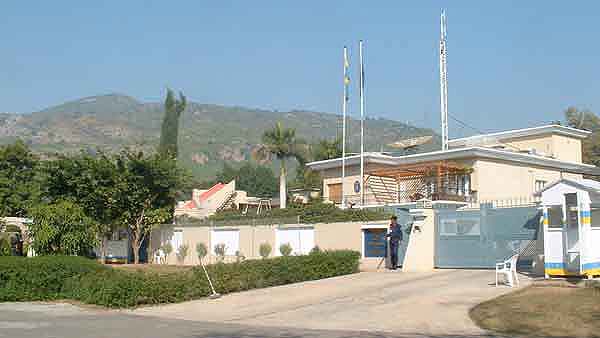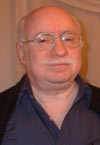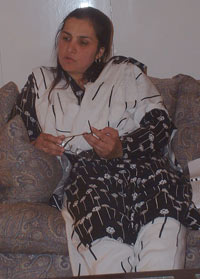SWEDISH SOUTH ASIAN STUDIES NETWORK
Meetings in Islamabad Monday 26 November 2003:
 Swedish
Embassy
Swedish
Embassy
We visited the newly appointed Swedish ambassador to Pakistan,
Ann Wilkens, and the Counsellor
Dag Juhlin-Dannfelt at the
Swedish embassy in Islamabad’s area F, with a beautiful view
of the Margalla Hills.
The Swedish International Development Cooperation Agency Sida is not much
involved in development cooperation with Pakistan anymore. It was a long
time ago when the left-hand driven Volvo buses arrived in Pakistan as
a gift from the Swedish people after we went over to drive on the right
side of the road in 1967!
The once thrifty Pakistani-Swedish Institute is long dead
and buried. Military rule and the Bangladesh liberation war of 1971 did
away with all this. We now ask whether things might be revived, and cooperation
be established again?
We discussed with ambassador Wilkens the proposal
by Dr. Atta-Ur-Rahman to send Pakistani science students
for PhD studies in Sweden.
Ann Wilkens thought it was a good initiative worth following up. We promised
to keep in touch on this.
With so little of interaction between Sweden and Pakistan, education would
be one non-controversial field in which there could be more of cooperation
in the future. University exchange could be organised in various ways,
etc. Ann Wilkens had just visited the the Ali
Institute of Education in Lahore, which is an institute for primary
and secondary education, involved in a Linnaues Palme
exchange programme with an institution in Sweden. Maybe SASNET could
play a role here by involving some of its partners at a Swedish teachers
training college?
Since we were planning to visit Kabul, we discussed with Dag Juhlin-Dannfelt, who has spent the last few years in Pakistan, frequently visiting Afghanistan, about the security situation there after the recent turmoil (November 2003), and the advances made by the Taliban in the southern part of the country. The understanding on his part was that the evaluations given by SCA, Swedish Committee for Afghanistan, with experienced staff staying inside the country, were the most reliable. We decided to follow their advice.
Meeting with Zahid Hussein
 We
spent the late afternoon with Mr. Zahid
Hussein, an old friend of Dr. Ishtiaq
Ahmed of Stockholm University, who had also been the liaison person
for this meeting. Zahid Hussein is a political scientist of wide experience.
He served for many years as an English language teacher in Somalia and
Nigeria.
We
spent the late afternoon with Mr. Zahid
Hussein, an old friend of Dr. Ishtiaq
Ahmed of Stockholm University, who had also been the liaison person
for this meeting. Zahid Hussein is a political scientist of wide experience.
He served for many years as an English language teacher in Somalia and
Nigeria.
After his return to Pakistan in 1978, he has worked as a consultant to
the Pakistani government and international organisations.
His main field of specialisation is social marketing, especially in the
field of health and environment. Much of his work is carried out within
the NGO Sustainable Resource Foundation (SURF)
in which he is the President. He should be an ideal partner in various
social consultancy projects. He also works with recruitment of students
to Australian universities and he offered to do the same service on a
non-profit basis for Lund University.
A keen observer of Pakistani politics and social development he also offered
to write articles for our Swedish magazine Sydasien. We will be eagerly
waiting for his manuscript.
Meeting with Nasim Zehra
 In
the evening we had dinner at Nasim Zehra’s home in the Diplomatic
quarters of Islamabad, close to the Swedish Embassy. Nasim Zehra is an
M Phil in political science from Harvard University, USA, nowadays working
as a writer and free consultant to the government and international organisations.
In
the evening we had dinner at Nasim Zehra’s home in the Diplomatic
quarters of Islamabad, close to the Swedish Embassy. Nasim Zehra is an
M Phil in political science from Harvard University, USA, nowadays working
as a writer and free consultant to the government and international organisations.
Nasim has a vast knowledge and strong views about Pakistani domestic and
foreign politics. Currently she is writing a book on Pakistan-India relations.
She tries to do away with usual mutual stereotypes delving into the actual
obstacles to a settlement in the Kashmir and other issues. She suggests
that peace must come out of a process, involving a win-win situation for
both sides. There must be a bottom line from where to go. We ha a vivid
discussion on this life and death issue for the future of Pakistan, India
and maybe the rest of the world. The influence of the events in Afghanistan
and Iraq is a complicating factor, which is very hard to predict.
The intellectual elite of Islamabad – Lahore – Karachi circles
is all within her network and reach, and we were given lots of advise
on names and institutions, and how to proceed in networking to promote
exchange and cooperation in research and education between Pakistan and
Sweden. We were to follow up some of these leads in Lahore and on our
return to Islamabad.
Nasim Zehra is also the organiser of the panel
on ‘Politics, Power and Islam in South Asia’ at the 18th
European Conference of Modern South Asian Studies, that SASNET and Lund
University organises in July 2004.
SASNET - Swedish South Asian Studies Network/Lund
University
Address: Scheelevägen 15 D, SE-223 70 Lund, Sweden
Phone: +46 46 222 73 40
Webmaster: Lars Eklund
Last updated
2006-01-27
